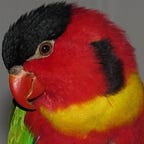How Is Being Brainy Correlated To Longevity In Parrots?
Parrots apparently evolved larger brain sizes so they could solve problems that might otherwise have killed them, and their braininess ended up promoting their long-term survival
© by GrrlScientist for Forbes | Twitter | Newsletter
Why are parrots so long-lived? It’s an obvious question that is not well understood by the scientific community despite the fact that parrots have lived in close association with people for thousands of years.
We do know that larger animals generally live longer than smaller ones, but other factors, such as diet, latitude and sociality also affect longevity (Figure 1). But even the largest parrots are much smaller than people, yet macaws and cockatoos live as long as most people. According to new research, it turns out that longevity and brain size are closely linked: brainy birds tend to evolve long lifespans. But why?
There are three main hypotheses that may explain this relationship between a large brain and a long life. They are:
- the Cognitive Buffer Hypothesis proposes that the greater intelligence that is typically associated with a larger brain serves to reduce the likelihood of premature death (ref). Thus, brainy individuals were more likely to survive to adulthood and to breed, thereby passing on their genes for…
